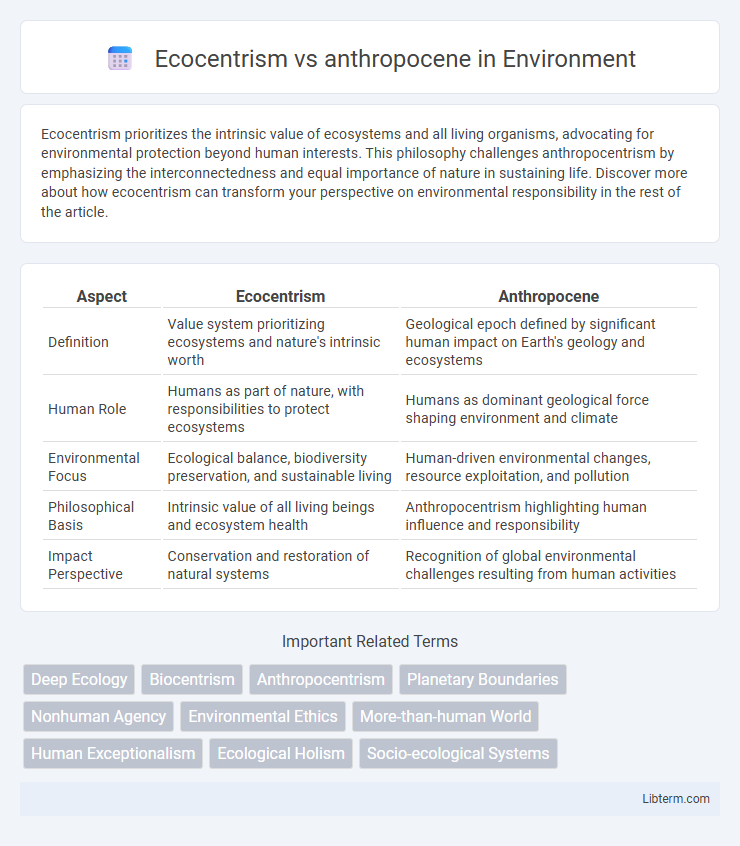Ecocentrism prioritizes the intrinsic value of ecosystems and all living organisms, advocating for environmental protection beyond human interests. This philosophy challenges anthropocentrism by emphasizing the interconnectedness and equal importance of nature in sustaining life. Discover more about how ecocentrism can transform your perspective on environmental responsibility in the rest of the article.
Table of Comparison
| Aspect | Ecocentrism | Anthropocene |
|---|---|---|
| Definition | Value system prioritizing ecosystems and nature's intrinsic worth | Geological epoch defined by significant human impact on Earth's geology and ecosystems |
| Human Role | Humans as part of nature, with responsibilities to protect ecosystems | Humans as dominant geological force shaping environment and climate |
| Environmental Focus | Ecological balance, biodiversity preservation, and sustainable living | Human-driven environmental changes, resource exploitation, and pollution |
| Philosophical Basis | Intrinsic value of all living beings and ecosystem health | Anthropocentrism highlighting human influence and responsibility |
| Impact Perspective | Conservation and restoration of natural systems | Recognition of global environmental challenges resulting from human activities |
Understanding Ecocentrism: A Holistic Earth View
Ecocentrism promotes a holistic earth view that prioritizes intrinsic value in all living and non-living components of ecosystems, contrasting with the Anthropocene perspective that centers human impacts on the planet. This ecological philosophy emphasizes interconnectedness and sustainability, advocating for environmental ethics that extend beyond human interests. Understanding ecocentrism involves recognizing the planet as a complex, interdependent system where biodiversity and natural processes hold equal importance to human activity.
The Anthropocene Epoch: Defining Human Dominance
The Anthropocene Epoch marks a geological era characterized by significant human impact on Earth's ecosystems, climate, and geology. Ecocentrism challenges this human-centered perspective by emphasizing the intrinsic value of all living organisms and natural systems, advocating for a balanced coexistence rather than domination. Understanding the Anthropocene requires recognizing how industrialization, urbanization, and resource exploitation have accelerated environmental change, necessitating a shift toward sustainable, ecocentric policies to mitigate long-term ecological damage.
Philosophical Roots: Ecocentrism vs. Anthropocentrism
Ecocentrism, rooted in deep ecology, emphasizes the intrinsic value of all living organisms and ecosystems beyond human interests, advocating for a balanced relationship with nature. Anthropocentrism, underpinning the Anthropocene era, places humans at the center of moral concern and prioritizes human needs and technological progress in shaping the environment. This philosophical divergence influences environmental policies by contrasting nature-centric ethics with human-centered development approaches.
Environmental Ethics in a Human-Centered Age
Ecocentrism challenges the Anthropocene's human-centered paradigm by emphasizing the intrinsic value of all ecosystems beyond human utility, advocating for ethical frameworks that prioritize planetary health over anthropocentric interests. Environmental ethics in this era necessitate recognizing the interconnectedness of humans and nature, promoting policies that protect biodiversity and support sustainable coexistence. Balancing human development with ecological preservation demands a shift from exploiting natural resources to fostering mutual respect and responsibility for the Earth's intricate life systems.
Impacts of the Anthropocene on Ecosystems
The Anthropocene epoch, marked by significant human-driven environmental changes, has led to habitat destruction, biodiversity loss, and altered ecosystem functions worldwide. Ecocentrism emphasizes intrinsic ecological value, advocating for ecosystem preservation and restoration to counteract these impacts. Human activities such as deforestation, pollution, and climate change disrupt ecosystem services critical for maintaining planetary health and resilience.
Ecocentrism in Policy and Global Governance
Ecocentrism in policy and global governance emphasizes the intrinsic value of ecosystems, advocating for laws and international agreements that prioritize environmental health over human-centric exploitation. Frameworks like the Convention on Biological Diversity and the Paris Agreement reflect ecocentric principles by integrating ecosystem preservation and sustainable resource management into global commitments. This approach challenges anthropocene-driven policies that often prioritize economic growth, promoting instead a holistic governance model that harmonizes human activities within natural planetary boundaries.
Challenges of Integrating Ecocentric Perspectives
Integrating ecocentric perspectives in the Anthropocene faces challenges such as entrenched human-centered values that dominate policy-making and economic systems. The difficulty lies in shifting societal priorities from solely human benefits to recognizing intrinsic ecological value and interdependence. Overcoming these barriers requires rethinking legal frameworks and promoting environmental ethics that respect the rights of nature itself.
Climate Change: Human Agency and Nature’s Rights
Ecocentrism emphasizes the intrinsic value of all living entities and ecosystems, advocating for nature's rights independent of human utility, contrasting with the Anthropocene perspective that centers on human agency as the dominant force shaping climate change. Climate change, driven by anthropogenic greenhouse gas emissions, underscores the urgent need to reconcile human development with environmental stewardship and recognize the legal standing of ecosystems. Protecting nature's rights involves integrating ecological limits into policy frameworks, challenging anthropocentric governance that prioritizes economic growth over sustainable planetary health.
Ecocentrism as a Pathway to Sustainability
Ecocentrism prioritizes ecosystems and biodiversity, advocating for intrinsic value in nature rather than solely human-centered benefits, making it a vital framework for sustainable development. By emphasizing interconnectedness between humans and the natural environment, ecocentrism challenges the exploitative tendencies of the Anthropocene epoch, which is marked by significant human impact on Earth's geology and ecosystems. This shift towards ecocentric principles fosters long-term ecological resilience and sustainable resource management, essential for mitigating climate change and biodiversity loss.
Future Directions: Reconciling Human Progress with Earth’s Limits
Future directions in reconciling human progress with Earth's limits emphasize integrating ecocentrism into Anthropocene governance frameworks, promoting sustainable development that respects ecological boundaries. Innovative policies prioritize circular economies, regenerative agriculture, and renewable energy technologies to reduce humanity's carbon footprint while supporting biodiversity. Embracing indigenous knowledge systems and fostering global cooperation are crucial for creating resilient socio-ecological systems that balance human well-being with planetary health.
Ecocentrism Infographic

 libterm.com
libterm.com